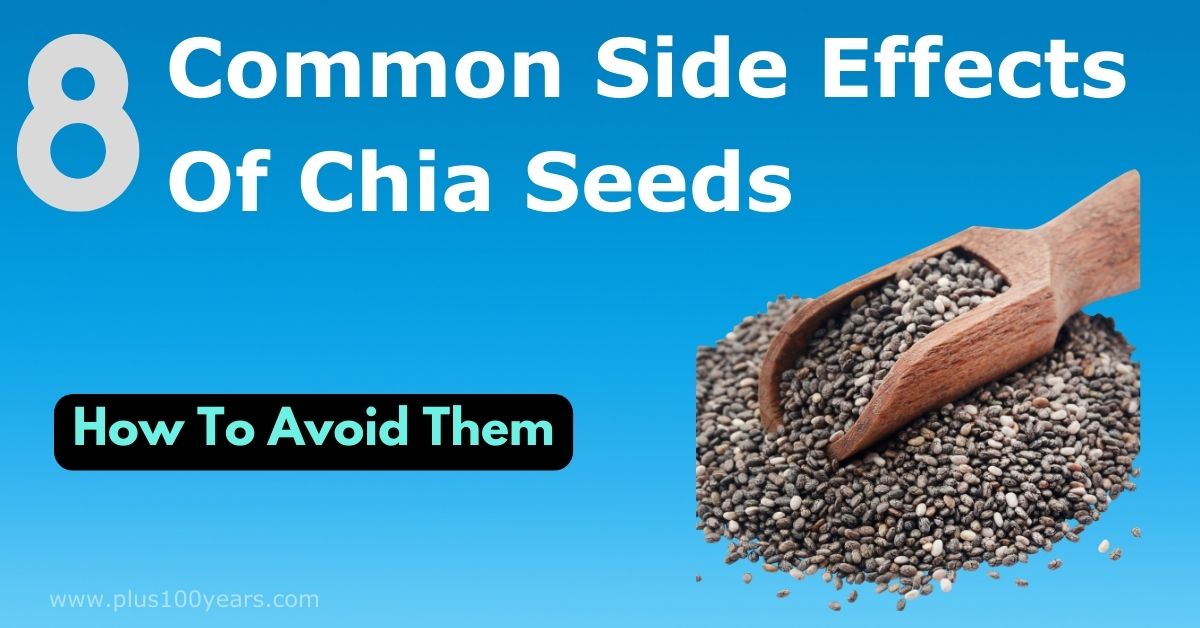
Chia seeds are a truly versatile superfood, whether you're adding them to your morning smoothies or creating overnight oats.
Full of fiber and other amazing nutrients, bearing a crunchy or creamy texture (depending on how you use them), these little seeds are no less than a delight.
That said, like any food, there are some side effects. In the case of chia seeds, these usually take effect when you go past a certain consumption limit or face allergies or drug interactions. Nevertheless, it always helps to stay informed!
A Brief Look At Chia Seeds
Chia seeds provide a wealth of nutritional value, as they are rich in protein, omega-3 fatty acids, and soluble fiber.
However, if you are wondering whether you can indulge in them abundantly to get as much nutritional value as possible, you should know the side effects. Loading up on chia seed in breakfast, salad, puddings, and smoothies on the same day may not be as advantageous as you may think!
Side Effects of Chia Seeds: Over-Consumption
Think of chia seeds as the main ingredient for just one meal and a garnish for other times. Potential side effects of too much chia seeds include:
1. Mild To Severe Digestive Issues
Chia seeds are a fiber powerhouse; you get up to 10 grams of soluble fiber in just 2 tablespoons of these. While fiber is crucial for a healthy gut, too many chia seeds (and hence too much fiber!) can sometimes mess up your digestive system.
You may experience troubles such as:
Abdominal pain
Uncomfortable gas
Persistent bloating
Constipation
If you experience digestive problems after eating chia seeds, it's probably because you’ve had too much or have had insufficient water intake around that time.
2. Undiluted Seeds May Cause Choking
When you consume whole chia seeds, you must savor each bite and swallow them with caution. For people who have difficulty swallowing, this is especially necessary, as chia seeds may cause choking.
Research shows that chia seeds can increase up to a whopping 12 times when they absorb moisture. These tiny seeds have the remarkable ability to soak up surrounding water and transform into a gel-like substance.
You don't have to worry about this feature as long as you eat chia seeds the right way.
Avoid eating them whole if you have issues swallowing. Instead, crush them and add them to a liquid for easy intake.
Whole chia seeds are safer in meals with water and that that longer to be ready, such as overnight oats and pudding. Even then, chomp on the chia seeds in these without rushing!
Side Effects Of Chia Seeds: Health Conditions
In addition to overconsumption, there are other reasons you may experience side effects of chia seeds—such as some health conditions:
3. Allergic Reactions
Although it's uncommon, chia seed allergy does exist. If you have allergies to mustard seeds or sesame, chances are that you may be allergic to chia seeds as well. If you want to take the risk and test out tolerance, you can, but have safety measures at hand in case of an allergic reaction.
The common symptoms of chia seed allergy include itching lips and tongue, vomiting, and diarrhea.
4. Pregnancy & Breastfeeding
When it comes to prenatal and postpartum health, water intake is the highest priority. Also, the immune system is a tad sensitive.
Plus, newborns take the effect of the mother's diet through breast milk. Keeping all these facts in mind, consult your obstetrician before consuming chia seeds.
There are very few studies on the use of chia seeds during pregnancy, which is why you should know about safe amounts before fulfilling that craving for chia seed pudding!
5. Side Effects Of Chia Seeds: Drug Interactions
Inform your physician who is overseeing any ongoing treatments that you want to add chia seeds to your diet.
This superfood may interact with your medication. Generally, the medications that may likely react with chia seeds include:
6. Antiplatelets & Anticoagulants
Chia seeds are rich in omega-3 fatty acids, overuse of which can potentially heighten the risk of bleeding. So, if you are taking anticoagulant or antiplatelet medication for a heart condition, exercise caution!
7. Blood Pressure Medicines
If you’re on a medicine course to manage high blood pressure, using chia seeds may result in an excessive blood pressure-lowering effect if you take these in a meal after which you take your medicine.
Studies show that chia seeds may lower blood pressure in individuals with type 2 diabetes who consume BP medications.
8. Diabetes Medications
One of the benefits of chia seeds is that this superfood can lower blood sugar levels. The likely reason behind this is that the abundance of fiber in chia seeds slows down the absorption of sugar in the blood.
So, eating moderate amounts of chia seeds can help you! However, know that when it comes to type 2 diabetes, insulin doses are personalized.
Physicians warn against foods that cause sudden dips and spikes in blood sugar. Too many spoonfuls of chia seeds can do just that, so make sure to take your chia seeds carefully and adjust the dosage of your diabetes medication if necessary.
Bottom Line: Are Chia Seeds Side Effects Manageable?
Effortless to add to meals, pleasing in taste and texture, and a very Instagrammable addition to your smoothie bowls and salads—chia seeds are a gift indeed.
Nevertheless, it is necessary to be mindful of how much you consume. Also, take into factor your unique health condition and any medications you are on before you eat chia seeds.

Add new comment